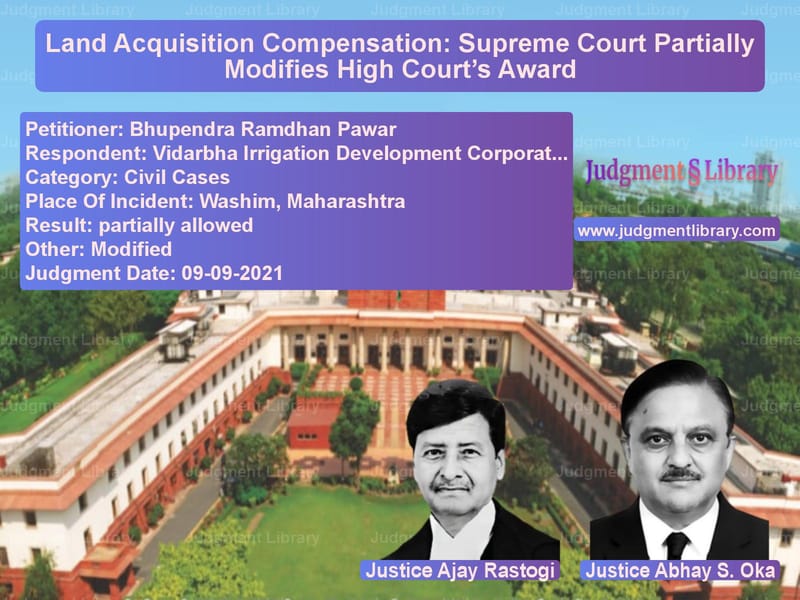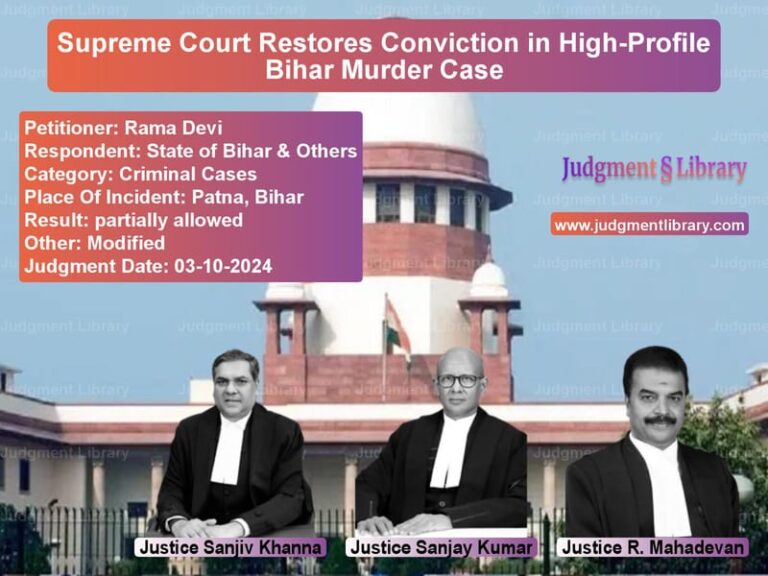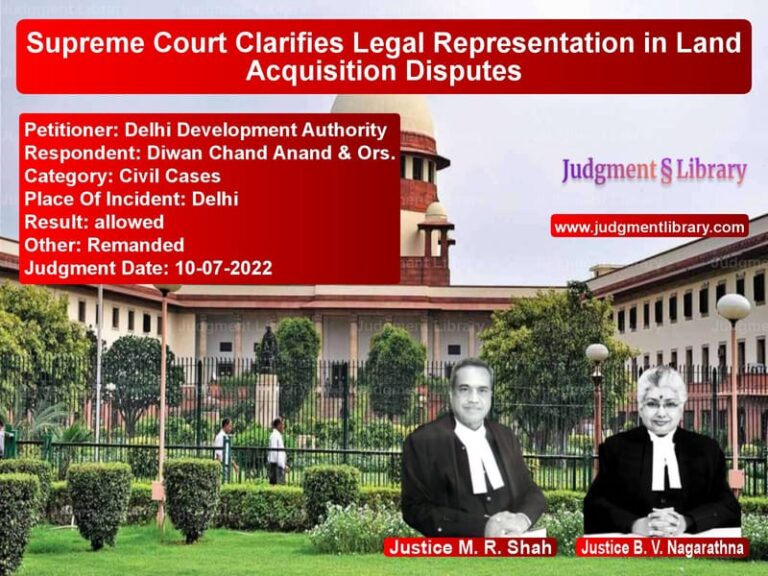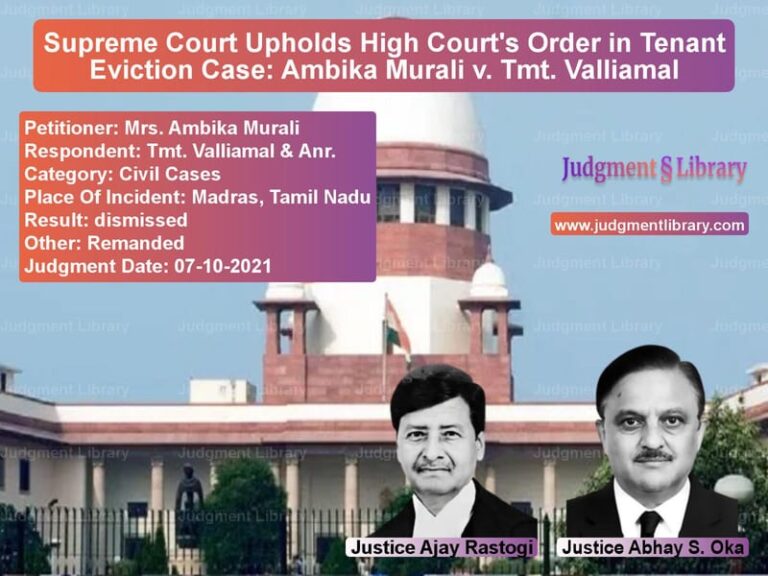Land Acquisition Compensation: Supreme Court Partially Modifies High Court’s Award
The Supreme Court of India recently ruled on a land acquisition compensation dispute in the case of Bhupendra Ramdhan Pawar vs. Vidarbha Irrigation Development Corporation, Nagpur & Others. The case revolved around the fair compensation for land acquired for irrigation development in Washim district, Maharashtra. The Court partially modified the compensation amount determined by the High Court of Bombay, ensuring fairer remuneration for the landowner.
Background of the Case
The land in question was acquired under the Land Acquisition Act, 1894. A notification under Section 4 of the Act was published in the Gazette on August 14, 1997, initiating the acquisition process. The appellant’s land, measuring 9 hectares and 98 ares in Mouza Khandala, Tq. Manora, District Washim, was acquired by the government for irrigation development.
The Land Acquisition Officer initially determined the compensation for different portions of the land as follows:
- Rs. 35,000 per hectare for dry crop land under Gat Nos. 1/1 and 1/2.
- Rs. 46,600 per hectare for land under Gat No. 11, based on revenue assessment and standing trees.
Dissatisfied with the compensation, the appellant sought enhancement through legal proceedings.
High Court’s Judgment
The appellant approached the Bombay High Court under Section 54 of the Land Acquisition Act. The High Court increased the compensation and awarded the following:
- Rs. 1,00,000 per hectare for 7.98 hectares of land (excluding 2 hectares cultivated with orange trees).
- Rs. 3,000 per tree for 554 orange trees.
- Rs. 91,305 as compensation for a well in Gat No. 1/1 and Rs. 26,000 for a well in Gat No. 1/2.
- Rs. 300 per tree for 327 firewood trees.
- Rs. 500 per tree for 400 Sindhi trees.
- Rs. 250 per tree for 30 berry trees.
The High Court, however, rejected the appellant’s claim for 100 mango trees, which were originally awarded Rs. 1,000 per tree by the reference court.
Arguments by the Petitioner (Bhupendra Ramdhan Pawar)
- The petitioner argued that the High Court’s compensation of Rs. 1,00,000 per hectare was inadequate.
- He cited two sale deeds from 1994 and 1996, which indicated market values of Rs. 50,000 per hectare in 1994 and Rs. 75,000 per hectare in 1996, showing a rising trend.
- Considering the acquisition took place in 1997, the petitioner argued for higher compensation based on appreciation.
- He contended that the High Court erred in not including the value of the 2 hectares of land cultivated with orange trees.
- He further challenged the rejection of compensation for 100 mango trees, arguing that they were wrongly excluded from the final assessment.
Arguments by the Respondents (Vidarbha Irrigation Development Corporation)
- The respondents argued that the compensation awarded by the High Court was fair and reasonable.
- They contended that the sale deeds cited by the petitioner could not be used as direct comparables because they involved smaller land parcels.
- They justified the rejection of the mango tree claim, citing revenue records from 1994–1999 that did not mention mango trees, while they did list orange and other trees.
- They pointed out that the compensation rate of Rs. 1,00,000 per hectare was already higher than the appreciation rate indicated by the petitioner’s sale deeds.
Supreme Court’s Key Observations
The Supreme Court examined the arguments and made the following observations:
- The compensation rate of Rs. 1,00,000 per hectare was reasonable and supported by sales data, requiring no further enhancement.
- For 2 hectares of land where orange trees were cultivated, the High Court had considered only the value of the trees but not the land value.
- The Supreme Court cited Ambya Kalya Mhatre vs. State of Maharashtra (2011), stating that when land value is determined based on sales statistics, trees should be valued separately.
- Following this principle, the Supreme Court ruled that the petitioner should receive Rs. 1,00,000 per hectare for the 2 hectares of land in addition to tree compensation.
- The claim for 100 mango trees was rightly rejected, as revenue records did not support their existence at the time of acquisition.
Final Verdict
- The Supreme Court partially allowed the appeal.
- The compensation rate of Rs. 1,00,000 per hectare was upheld.
- An additional compensation of Rs. 2,00,000 was awarded for the 2 hectares of land cultivated with orange trees.
- The rejection of the mango tree compensation claim was upheld.
- The final compensation calculation was to be completed within three months.
Implications of the Judgment
This judgment has several important legal and policy implications:
- Fair Land Valuation: The ruling reinforces the need for accurate market-based valuation of acquired land.
- Separate Valuation of Land and Trees: The Court reaffirmed the principle that when land value is based on sales data, compensation for trees should be awarded separately.
- Revenue Records as Crucial Evidence: The rejection of the mango tree claim highlights the importance of maintaining accurate land and agricultural records.
- Timely Compensation: The Court set a deadline of three months for payment, reinforcing the principle of timely compensation in land acquisition cases.
Conclusion
The Supreme Court’s ruling in Bhupendra Ramdhan Pawar vs. Vidarbha Irrigation Development Corporation ensures a fairer compensation mechanism for landowners affected by government acquisitions. By upholding the Rs. 1,00,000 per hectare rate while granting additional compensation for excluded land, the judgment balances government development needs with landowner rights. The decision also strengthens legal precedents regarding land valuation and compensation methodology under the Land Acquisition Act, 1894.
Petitioner Name: Bhupendra Ramdhan Pawar.Respondent Name: Vidarbha Irrigation Development Corporation, Nagpur & Others.Judgment By: Justice Ajay Rastogi, Justice Abhay S. Oka.Place Of Incident: Washim, Maharashtra.Judgment Date: 09-09-2021.
Don’t miss out on the full details! Download the complete judgment in PDF format below and gain valuable insights instantly!
Download Judgment: bhupendra-ramdhan-pa-vs-vidarbha-irrigation-supreme-court-of-india-judgment-dated-09-09-2021.pdf
Directly Download Judgment: Directly download this Judgment
See all petitions in Damages and Compensation
See all petitions in Property Disputes
See all petitions in Judgment by Ajay Rastogi
See all petitions in Judgment by Abhay S. Oka
See all petitions in partially allowed
See all petitions in Modified
See all petitions in supreme court of India judgments September 2021
See all petitions in 2021 judgments
See all posts in Civil Cases Category
See all allowed petitions in Civil Cases Category
See all Dismissed petitions in Civil Cases Category
See all partially allowed petitions in Civil Cases Category







